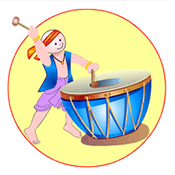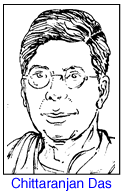
Dimdima
Online Children's Magazine from India

Dimdima
Online Children's Magazine from India
| A People Reject Their Rulers |
|
|
 Thousands
of lawyers joined in the boycott of British courts. Among them were eminent
lawyers like Chittaranjan Das, Motilal Nehru, his son, Jawaharlal Nehru, C.
Rajagopalachari, Rajendra Prasad, Vallabhbhai Patel, Saiffuddin Kitchlew, Asaf
Ali and T. Prakasam — all of whom gave up lucrative practices.
Thousands
of lawyers joined in the boycott of British courts. Among them were eminent
lawyers like Chittaranjan Das, Motilal Nehru, his son, Jawaharlal Nehru, C.
Rajagopalachari, Rajendra Prasad, Vallabhbhai Patel, Saiffuddin Kitchlew, Asaf
Ali and T. Prakasam — all of whom gave up lucrative practices.
Volunteers went from house to house to collect clothes made from foreign cloth.
The clothes were burnt in the presence of the people of the locality in huge
bonfires.
As freedom in the true sense meant breaking "shackles of social bondage of every
kind," a campaign was launched to persuade people to give up the practice of
untouchability.
A temperance movement was formed to free people from the "demon of drink".
Volunteers stood at the entrances of liquor shops especially those selling
foreign liquor to discourage patronage.
In Bengal when the government banned Congress volunteers from selling khadi,
Chittaranjan Das sent his son to sell khadi and court arrest. On the following
day, his wife, Basanti Devi, accompanied by two other women went out to sell
khadi. When the police took her into custody, thousands of people poured into
the streets and courted arrest. Imprisonment became a badge of honour and the
jails in the country could not accomodate the great number of prisoners.
"We must widen the prison gates," Gandhi had said, "and we must enter them as a
bridegroom enters the bride's chamber. Freedom is to be wooed only inside prison
walls and sometimes on the gallows, never in the council chambers, courts or
school rooms."
| ||
Dimdima is the Sanskrit word for ‘drumbeat’. In olden days, victory in battle was heralded by the beat of drums or any important news to be conveyed to the people used to be accompanied with drumbeats.
Bharatiya Vidya Bhavan
K. M Munshi Marg,
Chowpatty, Mumbai - 400 007
email : editor@dimdima.com
Bharatiya Vidya Bhavan
505, Sane Guruji Marg,
Tardeo, Mumbai - 400 034
email : promo@dimdima.com
Dimdima.com, the Children's Website of Bharatiya Vidya Bhavan launched in 2000 and came out with a Printed version of Dimdima Magazine in 2004. At present the Printed Version have more than 35,000 subscribers from India and Abroad.